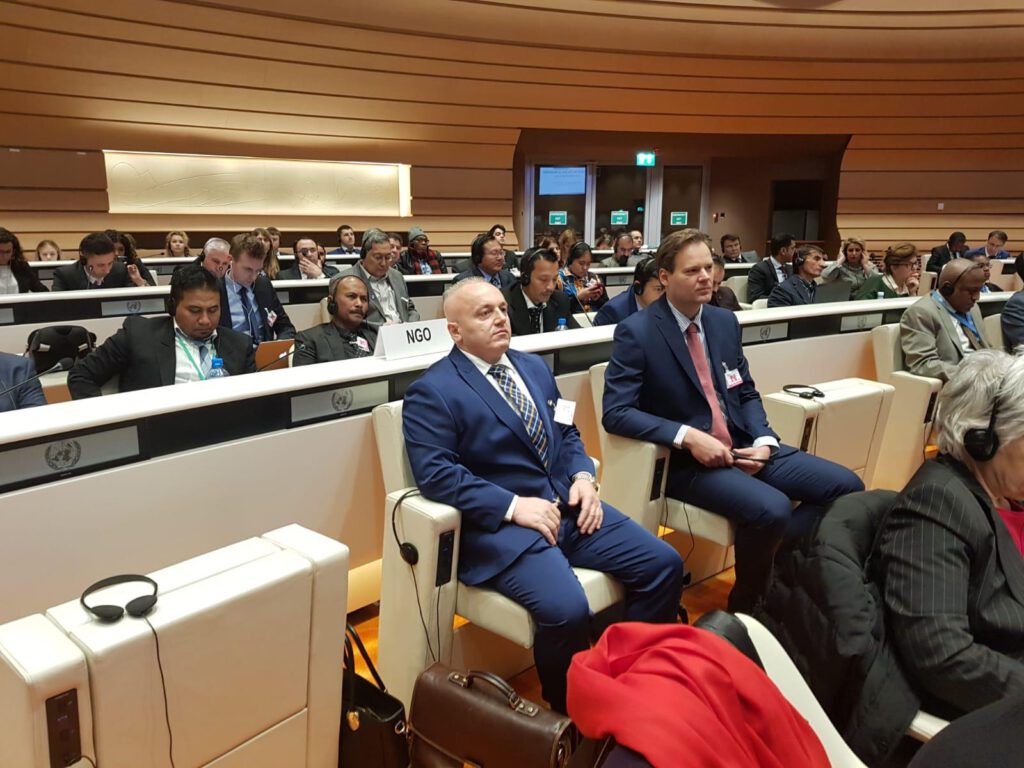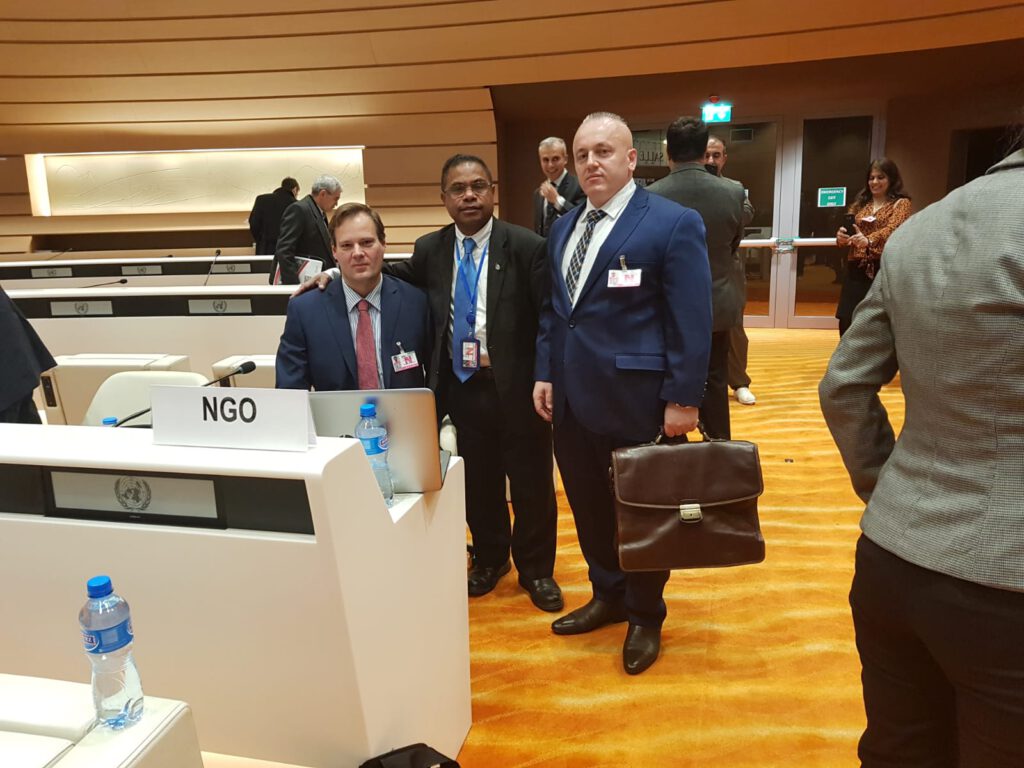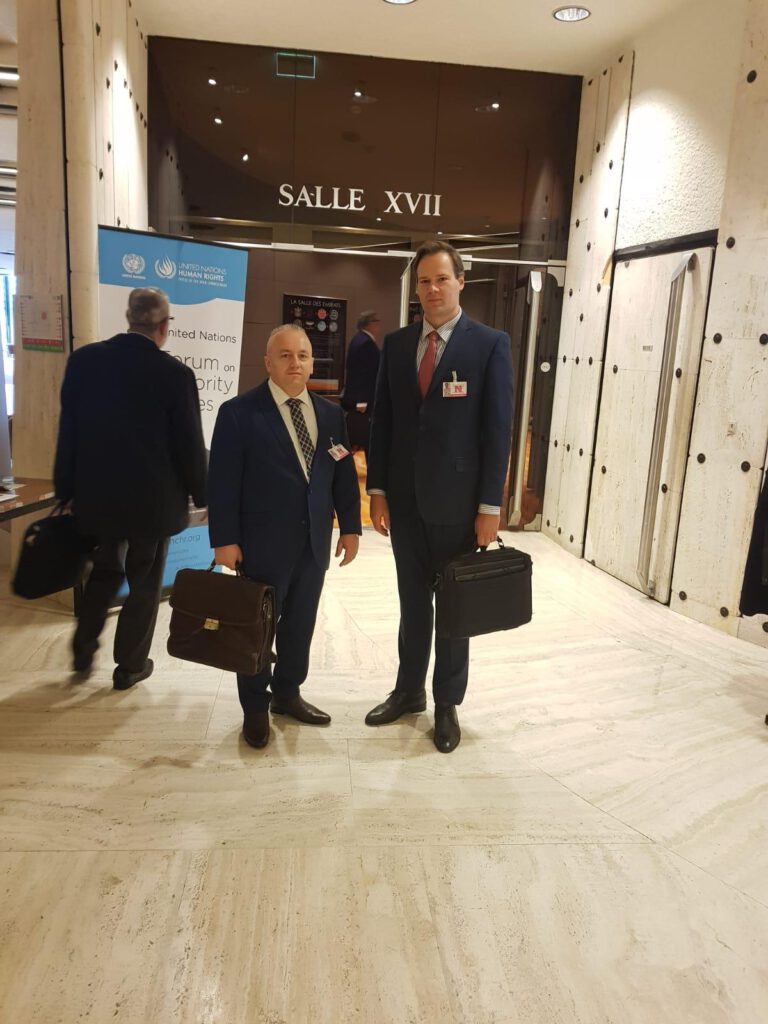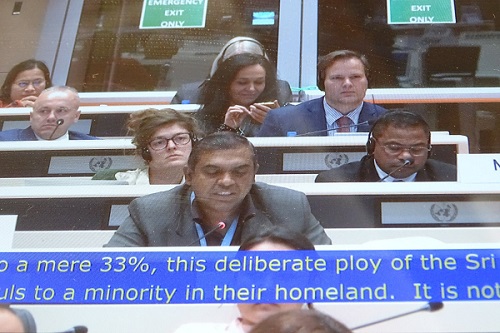On 29 and 30 November 2018, the Eleventh Session of the UN Forum on Minority Issues was held in the Palais de Nations in Geneva, Switzerland.
The Forum on Minority Issues meets annually for two working days allocated to thematic discussions. The Special Rapporteur on Minority Issues guides the work of the Forum, prepares its annual meetings and reports on the thematic recommendations of the Forum to the Human Rights Council.
The Forum aims at addressing the interrelatedness and interconnection between the promotion and protection of the human rights of persons belonging to national or ethnic, religious and linguistic minorities and statelessness. This year’s Forum had the theme “Statelessness: A Minority Issue”.
The Democratic Foundation of Chameria president Festim Lato, together with Mr. Jeroen Zandberg, was in Geneva, Switzerland during these days to attend the Forum, present a statement, and submit a report and to meet with representatives of civil society organisations and government officials in order to bring the Cham issue to the attention of the international community.

The theme of this year’s conference, statelessness, was very relevant for Chameria. Following many meetings in Brussels during 2018, the Cham issue was placed on the political agenda through a motion for the report on Albania of the Foreign Affairs Committee of the European Parliament. The main issue of this motion is directly related to the issue of statelessness. During the Second World War the Cham population was expelled from their homeland Chameria and had to seek refuge in Albania. While living as refugees in Albania they were stripped of their citizenship in 1947 and subsequently also of the legal entitlement to their properties through the law of confiscation of 1953-54. Furthermore, the Greek government, weary of any claim by the Cham on their ancestral territory, does not recognise the passports of most of the Cham-Albanians born in Chameria as valid travel documents.
The Democratic Foundation of Chameria president was at the United Nations to get international support for the resolution of the Cham issue. In his contribution the president officially requested the United Nations to take up the Cham issue and recognise the human rights violations committed against the Cham people. The president has been in contact with the United Nations Secretariat regarding the Cham issue and expects that they will cooperate in addressing it and seek a fair and balanced solution. The Special Rapporteur will produce a report based on the communications he received during the Session and will present recommendations and proposals, which will most likely also contain information about the Cham that was provided to the UN during, before and after the meeting. This is another step towards further internationalising the Cham issue and put pressure on all the parties in the conflict to come to the table and find solutions.

The contribution to the United Nations:
The Cham are an indigenous people with a Cham-Albanian culture who lived for many centuries in the historical region of Chameria, which is now Northwestern Greece.
The citizenship of my parents and their generation was taken away by the Greek government through a special Law in 1947, after they drove us out by force into Albania during World War Two. This was described in great detail by the international community. The Albanian government did not help the Cham. Instead, they forced the Albanian citizenship upon the Cham community in 1953.
Because the Greek government took away the citizenship of the Cham we lost our houses and properties. This historical problem has not been solved and continues to limit the Cham people today.
Because the Greek government took the citizenship of my parents’ generation we also lost our political, cultural, social and economic rights. The Law of Confiscation adopted by the Greek government in 1953-54 formalised the seizure of Cham properties. In practice this means that many of the Cham are poor and are unable to cross the Albanian-Greek border even though they have valid Albanian passports.
The Greek government uses the argument that passports of people with Albanian citizenship who were born in the region of Chameria need to specifically state that their country of birth was Greece. The passports of Cham people born in the region of Chameria are completely valid documents with which they can travel to all countries in the Schengen area, except to Greece. This issue was discussed in the European Parliament this year.
Furthermore, in the territory where the Cham used to form the majority, the language is not recognised and the Cham are also not recognised as a minority.
Therefore, I call upon Greece to repeal the laws that took away our citizenship and properties. I also request the United Nations to support the Cham people and help resolve the Cham issue. We want to be recognised as Cham and we deserve the return of our citizenship and properties that were taken away from us.

